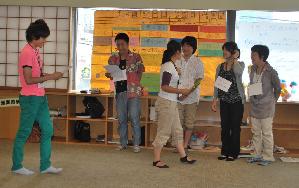From 5 to 8 August an ethics education workshop was held at the Myochikai premises in Tokyo to introduce and train members of the youth and women's division in the the Learning to Live Together Programme. The workshop brought together 28 participants whom for four days engaged in interactive dialogue and activities to learn about the conceptual and pedagogical framework of the manual and gain practical skills to implement it in their groups.
The workshop was open by Rev. Kenichiro Saito, Chairman of the Board of Directors of Arigatou International, who welcomed the participants and thanked Rev. Keishi Miyamoto, President of Arigatou International and Ms. Agneta Ucko, former Director of Arigatou International Geneva, for proposing the development of the first workshop on ethics education for Myochikai members. Rev. Miyamoto also welcomed the participants and wished a productive and fruitful meeting. Ms. Maria Lucia Uribe, Director Arigatou International Geneva, introduced the workshop, the work on ethics education that Arigatou has been doing during the last years and its contribution to peace. Ms. Masue Suzuki, Program Officer, Arigatou International New York office, introduced the World Day of Prayer and Action for Children and Ms. Vera Leal, Program Officer Arigatou International Geneva, introduced the work of Arigatou International with children and youth through the GNRC Youth Network. 
After introducing the program and getting to know each other activities, participants engaged in discussions about issues that affect their societies, their causes and impact on children and youth. Participants brought about discussions about bullying in schools, neglect in the family environment, lack of self-esteem and of someone to share problems with, isolation and lack of social participation of people with disabilities. This session encouraged reflection on child rights and the importance of ensuring a safe environment for children and youth to grow and develop.
During the next two days participants were engaged in a learning journey following the learning modules of the Learning to Live Togethe manual, where they had the opportunity to discuss and reflect about their own identity, the influence of their familiy, ancestors and others in their lives, and the importance of embracing and respecting diversity. They also engaged in practical activities about stereotypes and prejudices, in which participants reflected on the importance of going beyond the physical appearance when interacting with others, and discussed how sometimes, consciously and unconsciously, with our behaviours and actions we exclude, ignore, isolate and discriminate others. Through a session on non-violent communication and problem-solving participants practiced tools to deal with conflicts and improve their communication skills when facing difficult situations.
The second day ended with a session on spirituality through dialogue and a silent journey, followed by a session on Peace begings with me in which participants reflected on their individual responsibility to transform injustices and violence, and on the power each has to make a difference in the world through small and yet significant actions.
The pedagogical approach of the Learning to Live Together manual was introduced on the third day, including methodologies, learning modules, thematic kiosks, values and the learning process, as key elements to create a safe and participatory learning environment for children. Participants were guided to develop a program and plan a session based on the manual for the youth and women's divisions at Myochikai. On the fourth day, participants became facilitators and led other participants through practical activities. The youth group focused on diversity and putting oneself in others shoes, and the women's group focused on understanding self and others, putting oneself in others' shoes and non-violent alternatives. At the end of the workshop participants prepared action plans to implement the Learning to Live Together Programme in their groups and shared their main learning during the four days.
During the following weekend, the Myochikai youth division had its National Youth Summer Camp, where participants of the workshop had the opportunity to lead a three hour session based on the Learning to Live Together manual for more than 100 youth. This was the first time the youth from Myochikai put into practice what they learned during the workshop and worked together with others to promote mutual understanding and respect in the framework of the Arigatou Ethics Education Initiative. The women's division are also planning activities based on the manual to be conducted during their periodic meetings at Myochikai. It is expected that a follow up workshop to deepen the knowledge and skills to use the manual will be conducted in Spring 2014.
Thanks goes to Rev. Miyamoto for promoting this initiative, to the Arigatou International Secretariat for the logistical support, and to the members of Myochikai for their interest and participation in the workshop.